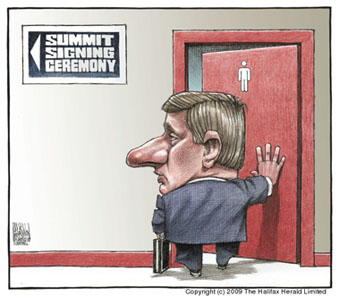Ho hum .. it’s December .. time to prorogue Parliament in Canada again – whatever that means, etc, etc ..
Dec 30th, 2009 | By Randall White | Category: In Brief
Bruce MacKinnon cartoon for The Halifax Herald Limited. Inspired by other events, it also captures the man who is apparently trying to establish a new tradition of proroguing the democratically elected Parliament of Canada every December, to avoid any trouble it might bring to his minority government, elected by less than 38% of the Canadian people.
WEDNESDAY, DECEMBER 30, 2009. [UPDATED DECEMBER 31]. So all the inside rumours about Canadian federal politics have now proved true. Today Canada’s minority Prime Minister Stephen Harper phoned Governor General Michaelle Jean and asked her to prorogue Parliament until March 3, 2010. And she has accepted the advice, as some would say she is bound to do.
To quote from the semi-official Canwest News Service report, “Harper’s spokesman Dimitri Soudas said … ‘We want to make sure the economy stays on track . . . and returns to balanced budgets’ … There is [also] speculation Harper has ended the current parliamentary session in order to appoint enough Conservative senators to gain control of key committees in the upper house.”
A “new throne speech [on March 3] will allow the government to re-organize the Senate, so the committees more accurately reflect existing seat distribution, Soudas said … Soudas also said the government is not proroguing Parliament to quiet investigations into the handling of Afghan prisoners by Canadian soldiers.”
The notion that Parliament must be prorogued “to make sure the economy stays on track . . . and returns to balanced budgets” is of course a fairy tale of massive proportions. And if you actually believe Parliament is not being prorogued “ to quiet investigations into the handling of Afghan prisoners,” then you probably think Stephen Harper is a good piano player too.
The minority Conservatives are no doubt guessing that they are not going to suffer unduly in the eyes of the voting public for this abject anti-democratic political manoeuvring, because most of us don’t even know what “prorogation” means. (And be honest: when we read in the Oxford dictionary that “prorogue” means “To discontinue the meetings of [a legislative or other assembly] for a time without dissolving it,” does that really help?)
The latest polls suggest that Mr. Harper’s short-term calculations may be right, for the moment. But this is all appallingly tacky and blatantly dishonest, to say the least. If you believe in the ultimate guiding wisdom of what the most successful prime minister in Canadian history so far used to call “the Canadian people and parliament,” Stephen Harper’s sins are going to catch up with him, sooner or later. There is more of a real democracy and a real country in this place than he imagines. Happily for him, it is a bit too preoccupied with other things right now. But one day it will wake up and wreak its vengeance, just like it did with Brian Mulroney.
UPDATE DECEMBER 31: Very early this morning, on the way home from listening to the excellent Leyland Gordon group at the Rex Hotel in Toronto, I rummaged through some old books in the office library. And I stumbled across a passage on prorogation from The Structure of Canadian Government, by J.R. Mallory – first published in 1971, with a second edition in 1984.
This passage [see pp. 222-223 of the 1971 edition] seems of some current interest in connection with Governor General Jean’s decision to prorogue the Canadian federal Parliament on December 30, 2009:

Stephen Harper speaks with his press secretary Dimitri Soudas three days before the October 14, 2008 election. Does anyone paying attention really believe Mr. Soudas in late December 2009, when he says Parliament is now being prorogued “to make sure the economy stays on track . . . and returns to balanced budgets”?
“Each session of Parliament must be brought to an end by the formal ceremony of prorogation. Like the summoning of Parliament, this is one of the powers of the Governor General, exercised on advice, and is thus one of the ways by which Cabinet can control a recalcitrant House. Prorogation has the effect of bringing all parliamentary business … to an end.”
The late Professor Mallory goes on: “Similarly, prorogation will bring any committee business to an end. This was an important constitutional issue in 1873, when [then Governor General] Lord Dufferin was waited on by a deputation of ninety Liberals urging him to refuse to agree to a prorogation request by the [John A.] Macdonald [Conservative] government. The effect of the prorogation, as everyone knew, would be to terminate abruptly the work of a parliamentary committee investigating certain matters connected with the Pacific [Railway] Scandal.”
Somewhat later in his discussion here, Mallory also notes: “The prorogation… of Parliament before a session has lasted a reasonable time is unusual, and rightly thought to show a lack of respect for parliamentary institutions.”
Although Mallory does not pursue the matter in detail, the case of Macdonald’s 1873 Pacific [Railway] Scandal prorogation may have some further early 21st century interest. Lord Dufferin, the Governor General of the day, did finally agree to Prime Minister Macdonald’s request – albeit, as Mallory writes, “with reluctance.” But the prorogation (“over the summer” of 1873 in this case) did not ultimately save the Macdonald government from defeat – both in Parliament and then in a general election.
All this is explained briefly in the Wikipedia article on the Canadian federal election of 1874. It “was held on January 22, 1874 … John A. Macdonald, who had recently been forced out of office as prime minister, and his Conservatives were defeated by the Liberal Party under their new leader Prime Minister Alexander Mackenzie … Macdonald’s government had been forced to resign on November 5, 1873 because of allegations of corruption relating to the construction of the Canadian Pacific Railway … The Liberals under Mackenzie formed a government two days later with an election called for January. The Tories were unable to recover from the scandal and lost the election” – which was also “the first to use secret ballots in Canada.”
In any case, Happy New Year Canada 2010 – even if it does sometimes seem we haven’t come all that far over the last 136 years!

